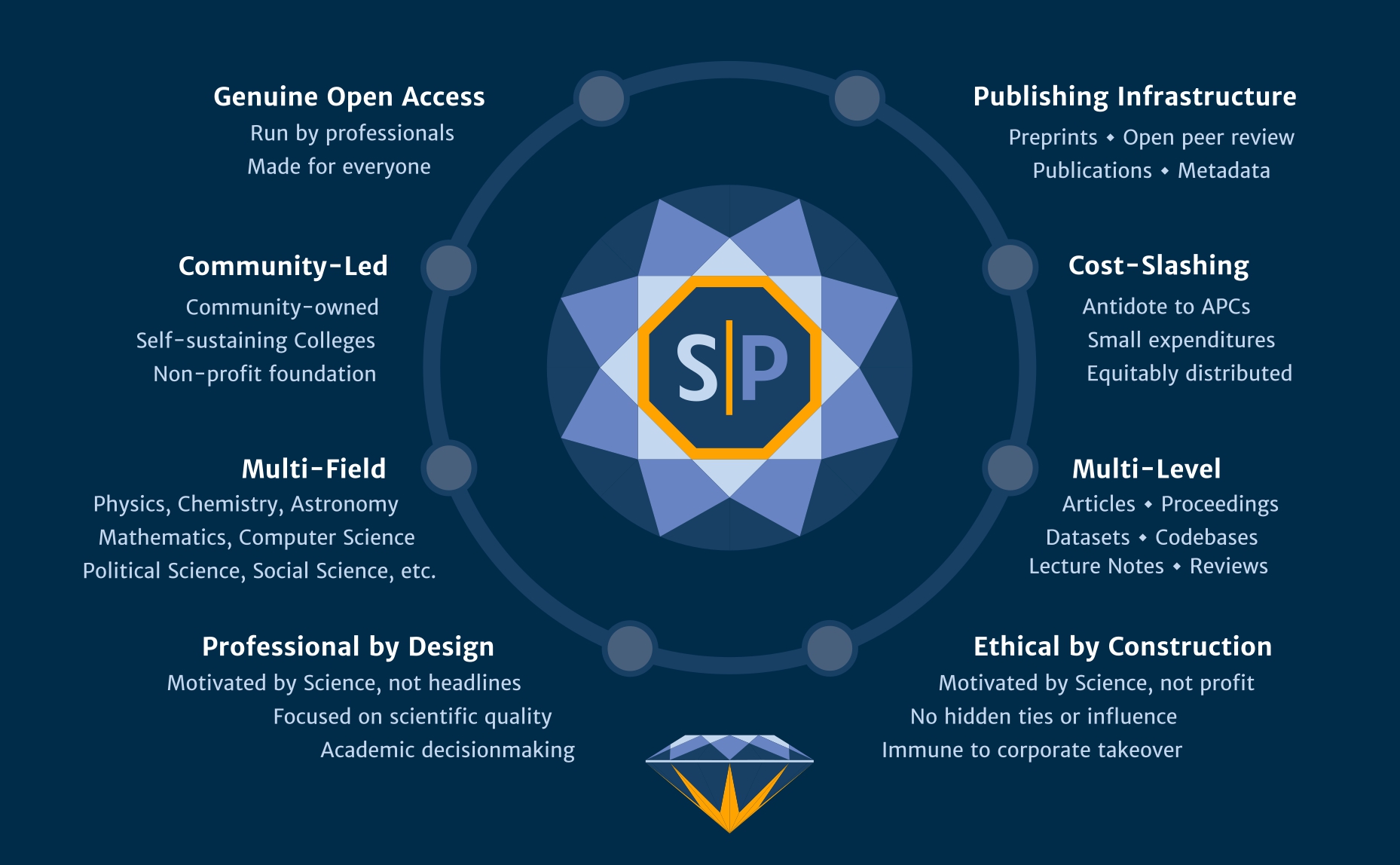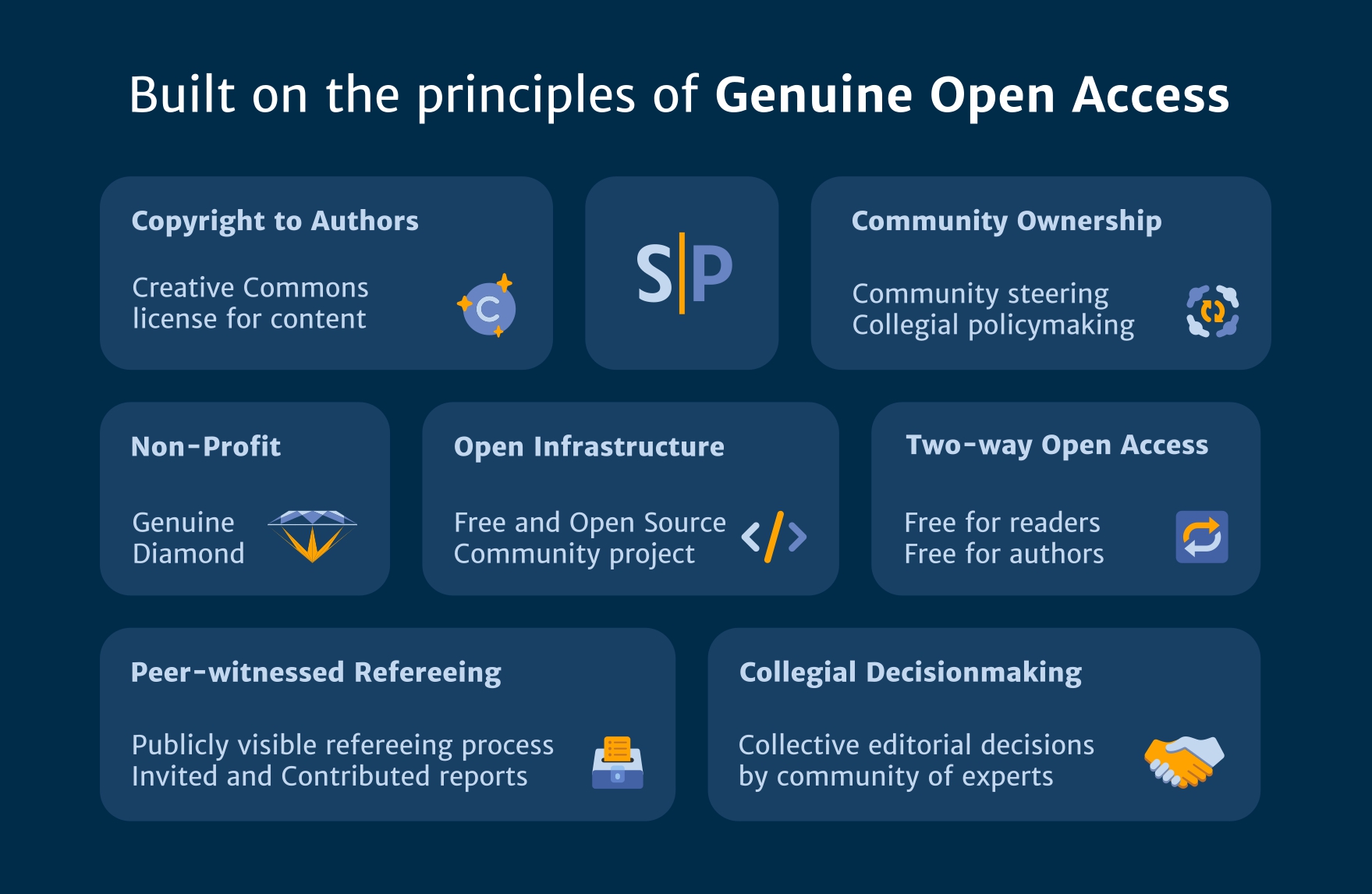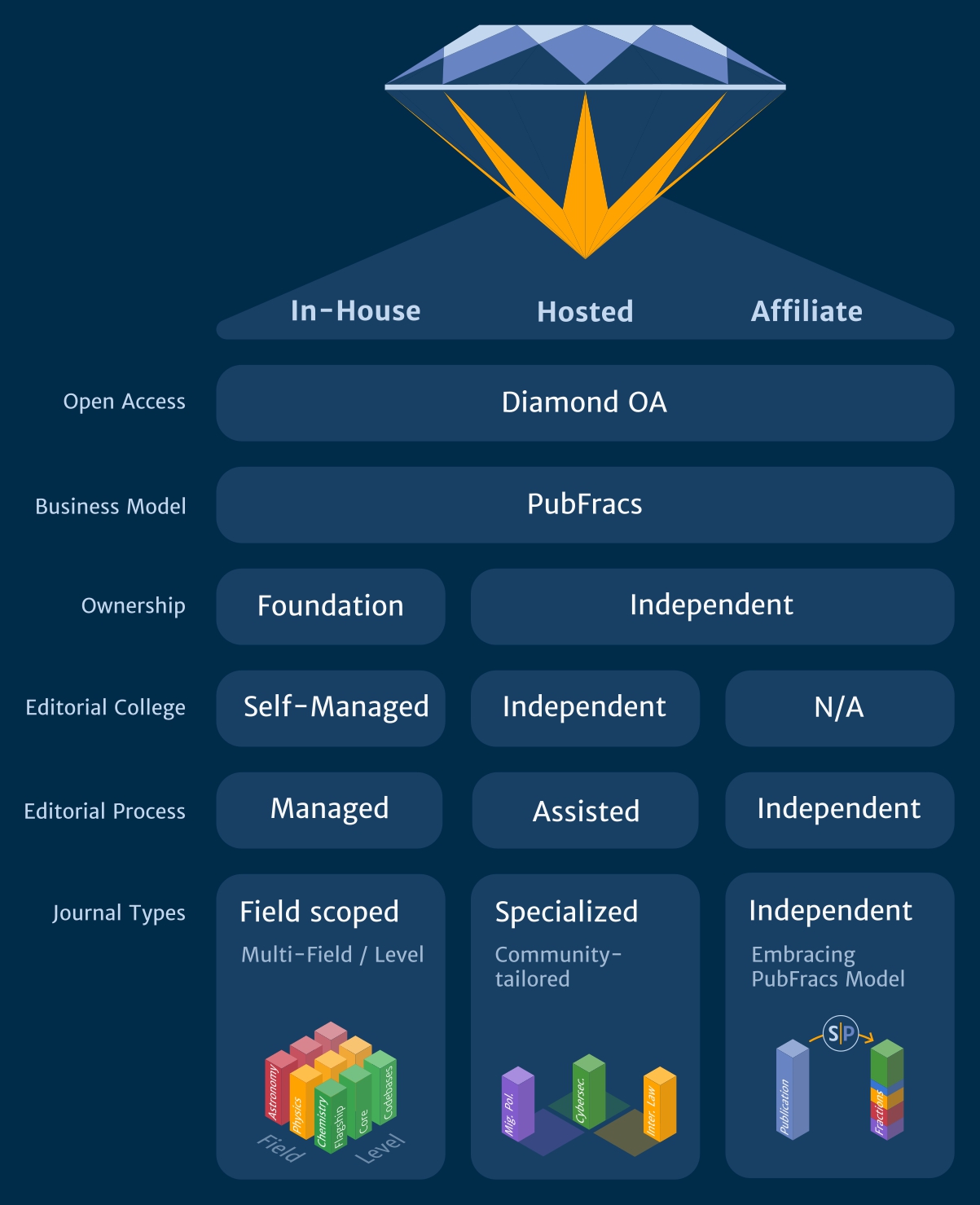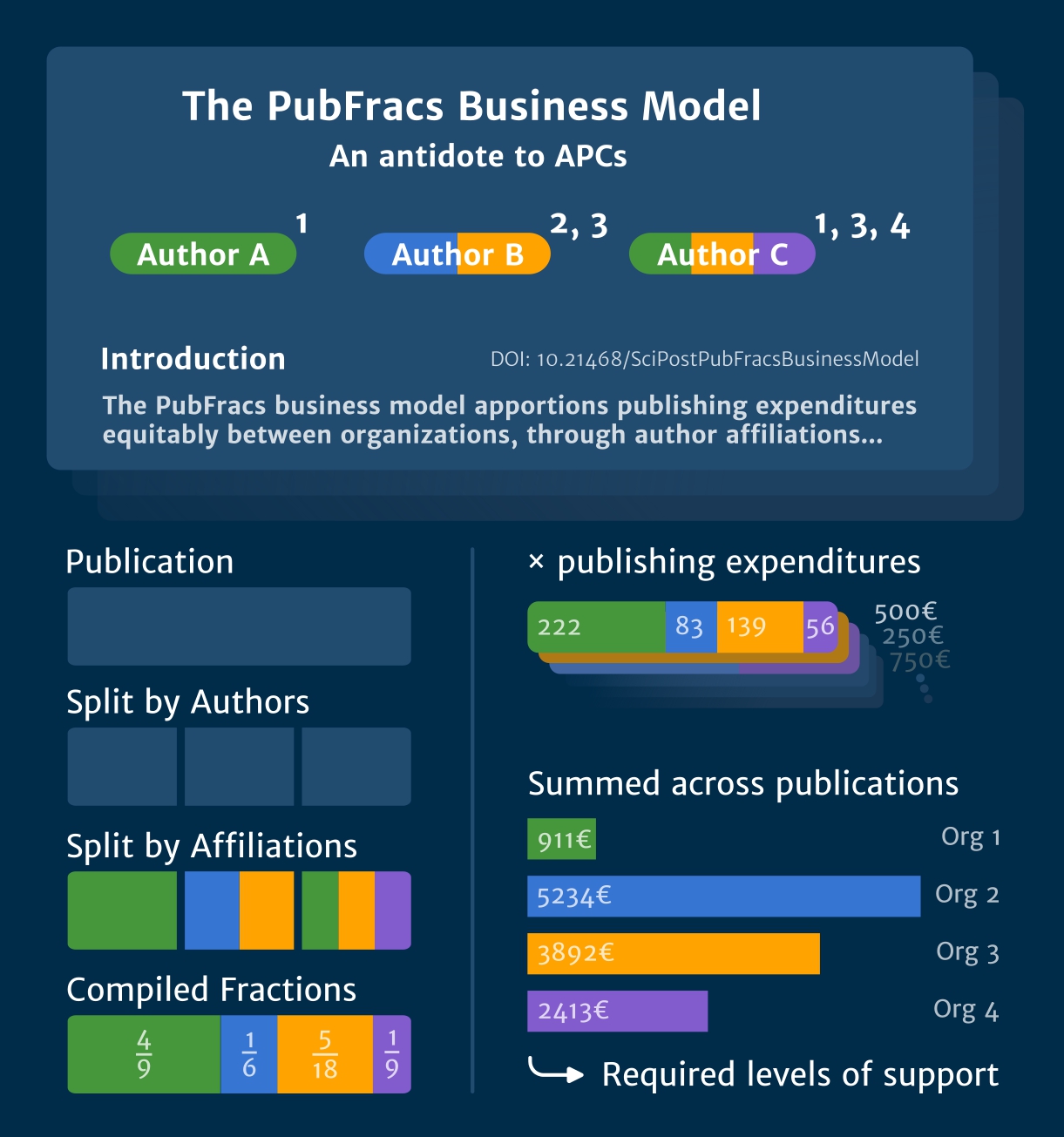About SciPost

SciPost is a complete online scientific publication portal managed by the SciPost Foundation.
Being managed by professional scientists, its Journals aim at the highest achievable editorial quality standards and provide freely, openly, globally and perpetually accessible science.
Our business model offers an affordable and equitable antidote to profitmaking alternatives.
Frequently asked questions
Guiding principles

- Two-way open access
Publicly-funded science should be openly accessible to scientists and the general public, perpetually, worldwide. Conversely, scientists should not have to pay publishing charges to disseminate the fruits of their research efforts. - Non-profit
Academics do not perform research for profit, and by extension the publication of their scientific results should not involve commercial profit-making. - By Professionals
Scientists should carry the final responsibility for all stages in the scientific publishing process. - Peer-witnessed refereeing
Scientific publications should undergo the strictest possible peer refereeing process, witnessed by the community instead of hidden behind closed doors. - Accountable and credited refereeing
Peer refereeing should be accountable, and should be incentivized by being credited. - Post-publication evaluation
Peer evaluation does not stop at the moment of publication.
The first principle is reflected in the fact that all publications and related content on SciPost.org are accessible to anybody with an internet connection. Moreover, publishing in SciPost entails no author charges.
The second principle is reflected in SciPost’s not-for-profit status. SciPost is financially backed by national granting agencies, universities, foundations and individuals.
The third principle is implemented by having only active scientists involved in SciPost’s decision-making and editorial processes.
The fourth and fifth principles are implemented using SciPost’s maximally stringent peer-witnessed refereeing process.
The sixth principle is implemented in the form of Commentary Pages associated to publications. These can either be SciPost Publications, or papers published elsewhere.
As an organization, and for all its Journals, SciPost follows the Genuine Open Access Principles:
| [CO] | Community Ownership | The Journal has a transparent community-anchored ownership structure, and is controlled by and responsive to the scholarly community. |
| [OI] | Open Infrastructure | The infrastructure for operating the Journal belongs to, and is open sourced to the community. The entire technological stack and all operating protocols are documented and made easily transferable between community owners. |
| [CA] | Copyright to authors | Authors of articles in the Journal retain copyright. The Journal assists authors in protecting their rights in case of infringement. |
| [OA] | Open Access | All articles are published open access and an explicit open access licence is used which is preferably Approved for Free Cultural Works. |
| [OC] | Open Citations | The Journal makes its citation metadata openly accessibly by actively participating in the Initiative for Open Citations. |
| [FF] | Fee Free | Submission, peer evaluation and publication are not conditional in any way on the payment of a fee from authors or their employing institution, or on membership of an institution or society. |
| [NP] | Non Profit | The Journal publisher's operations are entirely non profit. |
| [OF] | Open Finances | The Journal's finances are openly published and available for public scrutiny. |
| [AE] | Academic Editing | The editorial processes of the Journal are run by the community, and all editorial decisions are taken by active professional scientists, using exclusively academic scholarship-based criteria. |
These principles are an extension and sharpening up of the Fair Open Access Principles, the most important difference being the insistence on the non profit business model.
Our Infrastructure: 3 Pillars
At SciPost, we believe that the only realistic way to reform publishing is to build new infrastructure implementing things as academics, not corporations, want them. In this day and high-tech age, communities equipped with purpose-built systems and workflows are entirely able to independently take care of all their publishing needs. Our purpose is to empower such communities.
We implement this through a triad of pillars, each providing a different level of support:
-
In-house Journals
The first pillar consists of field-scoped journals implementing SciPost's open editorial procedure and run by Editorial Colleges of reputed specialists. Building up on our template in Physics, our vision is to extend our Genuine Open Access services to many other fields (with a portfolio of field-scoped Journals) and install a multi-field overarching journal called Selections highlighting the very best science from all fields and targeted towards a much broader readership (from non-specialists to journalists/press agencies all the way to the general public).
-
Hosted Journals
The second pillar complements the field-scoped in-house journals by providing more specialized field/specialty-targeted publishing venues run by independent Editorial Colleges. These journals make full use of SciPost's editorial, publishing, production and maintenance systems, and are fully embedded into (and thus supported by) SciPost's business model. An example of Hosted Journal is Migration Politics. Our vision is to upscale use of these facilities by supporting the creation and maintenance of a large portfolio of community-run but SciPost-hosted specialized journals (and thus naturally complementing the field-scope in-house journals of the first pillar).
-
Affiliate Journals
The third pillar empowers independently-run Diamond-class journals to make use of our financial information system for organizations linking publishing activities (via authors and their affiliations) with institutional support, enabling complete transparency in expenditures and returns on investment using our business model's PubFracs concept. Our vision is to upscale use of these facilities by onboarding a large family of existing Diamond journals, and by extension to effectively form a strong federation able to act synergetically as lobbying group for Diamond sustainability.

Our Business Model: PubFracs
Open Access has led to the burgeoning of a plethora of different business models, all too often characterized by inflated costs, inequity and lack of financial transparency. Few knowledgeable people doubt that researchers and academic institutions are currently being fleeced by publishers. The only way to stop this is to provide an alternative.
We propose a business model which is cost-slashing, equitable, and completely transparent. You will find a detailed explanation at our business model page, but the idea is rather simple to understand.
-
Publishing and interlinking
Organizations (author affiliations, funding agencies, ...) are interlinked with each Publication to which they are associated. -
Determining PubFracs
Upon publication, we compute our PubFracs (a fraction of a unit representing an Organization's "affiliations weight" for a given Publication). -
Compiling operational costs
On a yearly basis, we determine and make publicly known: our total expenditures, and an average expenditure per publication (APEX) -
Information display
We publicly display relevant information on expenditures and support received:- subsidies we have received
- organizations listing and country-level summaries
- an assessment of our current state of viability
-
Sustaining
We liaise with Organizations benefitting from our activities, who can inspect all the data and independently determine to which level they choose to support our activities. Generosity is appreciated, bearing in mind the proportion of non-supporting bystanders. We scale up, maintain or wind down our operations depending on how much support we can gather.
See full details at our business model page

The SciPost Team
-
Prof. Jean-Sébastien Caux
(University of Amsterdam)- Chairman SciPost Foundation
- Coding, Infrastructure
-
Dr Joost van Mameren
(University of Amsterdam)- Secretary SciPost
-
Prof. Jasper van Wezel
(University of Amsterdam)- Treasurer SciPost
-
Dr Sergio Enrique Tapias Arze
- Executive Director
-
Dr Francesca Ferrari
- Editorial Admin
-
Lieuwe Bakker
- Editorial Admin
-
George Katsikas
- Developer
-
Kyros Megalos Adam
- Production Supervisor
Advisory Board
- Prof. Mark Krumholz
(Australian National University)
- Prof. Gijs Nelemans
(Radboud University)
- Prof. Simon Portegies Zwart
(Leiden)
- Prof. Alan Aspuru Guzik
(U. Toronto)
- Prof. Jan H. Jensen
(U. of Copenhagen)
- Prof. William L. Jorgensen
(Yale University)
- Prof. Floris P.J.T. Rutjes
(Radboud U. Nijmegen)
- Prof. Douglas N. Arnold
(U. of Minnesota)
- Prof. Eric Opdam
(U. van Amsterdam)
- Prof. Nicolai Reshetikhin
(UC Berkeley)
- Prof. Christina Boswell
Dean of Research, College of Arts, Humanities & Social Sciences
(U. of Edinburgh)
- Prof. Hein de Haas
Professor of Sociology
(U. of Amsterdam)
- Prof. Irudaya Rajan
Centre for Development Studies
- Prof. Kamal Sadiq
(UC Irvine)
- Prof. Steven Vertovec
Founding Director,
Max Planck Institute for the Study of Religious and Ethnic Diversity
- Prof. Jos J. Engelen
(U. van Amsterdam) - Prof. Paul Fendley
(Oxford; All Souls College) - Prof. Sijbrand J. de Jong
(Radboud Univ. Nijmegen) - Prof. Jean Michel Maillet
(ENS Lyon)
- Prof. Petra Rudolf
(Groningen) - Prof. Theo Rasing
(Radboud U. Nijmegen) - Prof. Jörg Schmiedmayer
(TU Vienna) - Prof. Herbert Spohn
(TU Munich)
- Prof. Matthias Troyer
(Microsoft Research) - Prof. Erik P. Verlinde
(U. van Amsterdam) - Prof. Jook T. M. Walraven
(U. van Amsterdam)
Editorial Colleges
Please visit our Editorial Colleges page to view the list of our current Editorial Fellows in all our fields of activity.
